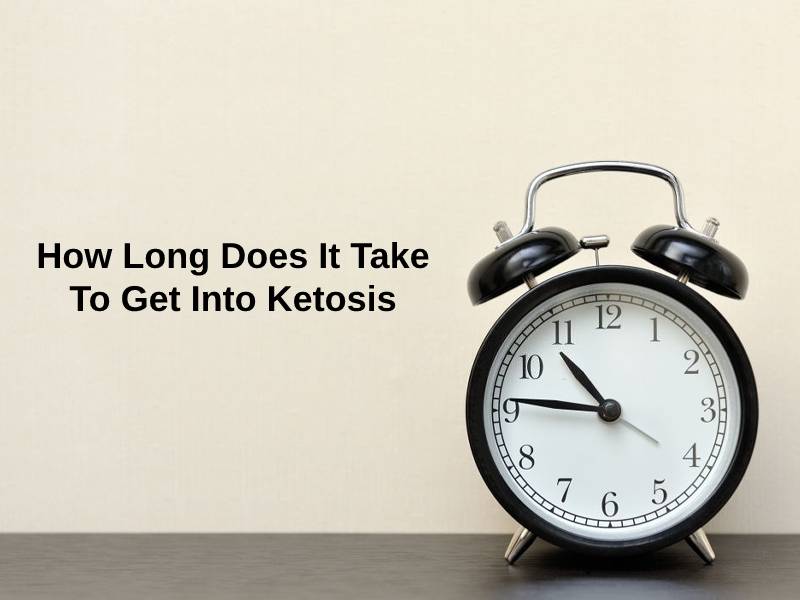Exact Answer: 2-4 Days
Ketosis is a process that occurs when your body lacks enough carbohydrates to burn for energy. Instead, it burns fat and produces so-called ketones that can be used as fuel. Ketosis is a word you come across when looking for information about diabetes or weight loss.
Ketosis is a popular low-carb weight loss program it not only helps burn fat but also reduces hunger and helps a person maintain muscles. Hence the process of ketosis depends if it’s good or bad for different persons.

How Long Does It Take To Get Into Ketosis?
In healthy, non-diabetic, and non-pregnant people, ketosis begins after 3-4 days of consuming less than 50 grams of carbohydrates per day. That’s about three slices of bread, a cup of low-fat fruit yogurt, or two small bananas. One can also start ketosis while fasting.
A diet high in fat and protein but very low in carbohydrates is called a ketogenic or simply a keto diet. There are also some health benefits of ketosis, and it can have a number of benefits beyond weight loss.
Doctors may prescribe children with epilepsy to a keto diet as this helps prevent seizures. Adults with epilepsy sometimes follow a modified keto diet also known as the Atkins diet. Several studies show that a ketogenic diet can help reduce the risk of heart disease.
Other studies show that diets that are very low in certain carbohydrates help people with conditions such as Metabolic syndrome, Insulin resistance, Type 2 diabetes.
While some of the researchers are also studying that the effect of these diets can lead to the following conditions as Acne, Cancer, Polycystic ovary syndrome ( PCOS), Nervous system diseases such as Alzheimer’s disease, Parkinson’s disease, and Lou Gehrig’s disease.
Summary:

| Ketosis period | Time Taken |
| Initialization | 24 hours |
| Final | 2- 4 days |
Why Does It Take So Long To Get Into Ketosis?

There can be quite a few side effects of the keto diet as well, during the first week of a ketogenic diet, you may feel unwell. Some people call it the keto flu, but this is not an official illness. Some doctors believe that this is due to the abolition of sugar and carbohydrates.
Many times it could be changed in gut bacteria or slow down the immune system response. A person may notice temporary side effects such as headache, fatigue, irritability, constipation, sleep problems, nausea, stomach pain, dizziness, sugar cravings, cramping, muscle pain, bad breath, also known as ketosis breathe.
To reap the benefits of a ketogenic diet, a body must enter ketosis, this is a metabolic condition in which the body converts fat into molecules called ketones, which are used as the main source of energy when glucose is limited.
In the digestive tract, carbohydrates are broken down into sugar molecules, such as glucose, so they can travel through the bloodstream and be used for energy. If a person has excess glucose in his body, it can be stored in the liver and muscles as glycogen stores.
By drastically reducing the carbohydrate intake to less than 50 grams per day, the body is forced to use glycogen stores for energy and eventually switch to using ketones, the time it takes to get into ketosis depends on person to person.
Overall, it will take 2 up to 4 days if consumed 20 to 50 grams of carbohydrates per day. However, some people may find it takes a week or more to reach this state, several factors can affect how long it takes to transition to ketosis, including a person’s usual daily carbohydrate intake, daily fat and protein intake, exercise, age, and metabolism.
Conclusion
In general, it will take 2-4 days to enter ketosis. However, some people may find that they need a week or more. How long it takes depends on a number of factors such as a person’s age, metabolism, exercise level, and the current carbohydrate, protein, and fat intake.
The best way to know if a person is in ketosis is to measure his ketone levels with ketone sensors in his breath, urine, or blood. If he is having trouble getting into ketosis, he should try tracking his carbohydrate intake, increasing his exercise volume, or following some of the other tips above.
 Samantha Nicole
Samantha Nicole
The comprehensive list of side effects that you’ve provided is really helpful. It’s good to know what to expect when starting a keto diet.
Absolutely. I think it’s better to be prepared for the keto flu than to be surprised by it.
My mind is blown by this fascinating information. The benefits of ketosis go far beyond weight loss, it seems!
I feel like I should be more careful about my carbohydrate intake. I didn’t realize it could affect how quickly I enter ketosis.
It’s so true. Knowing this information will definitely help me adjust my diet to transition to ketosis more efficiently.
This is so informative! It’s so interesting how many factors can affect ketosis, I’ve never paid attention to this before.
Yes, it is! I’m so excited to have this information to track my own journey into ketosis.
I’m glad to see factual science being discussed in relation to the ketogenic diet.
The scientific background and data in this article are very compelling. Now I feel equipped to make informed decisions about entering ketosis.
Agreed. It’s refreshing to see such a thorough and evidence-based approach to discussing ketosis.
I’m intrigued by the connection between a keto diet and nervous system diseases. This is very eye-opening.
It’s quite the revelation. I never knew ketosis could have such a broad impact on health conditions.
The timelines and science behind ketosis are laid out so clearly. I’m glad to have this guide to help me navigate into ketosis.
It’s definitely a valuable resource to understand the process of entering ketosis. Very insightful!
I’ve been trying to get into ketosis for a while. I see it’s a good idea to measure my ketone levels to track my journey.
Yes, this is such a good tip, I never thought about using sensors to track ketone levels before.
This information is revolutionary. I’m glad to see such detailed data on ketosis available.
I appreciate the detailed approach to explaining why it takes time to get into ketosis. This is a game-changer in managing expectations.
Yes, it’s good to be realistic about the timeline for entering ketosis. This article makes it easy to understand.
These are some helpful tips provided to enter ketosis. I think I’ll put this advice to good use and see how it goes.
It definitely sounds like a promising way to experiment with health and wellness.